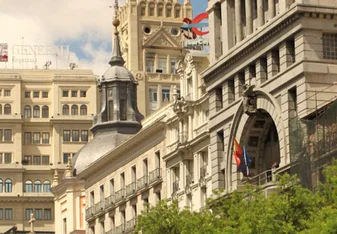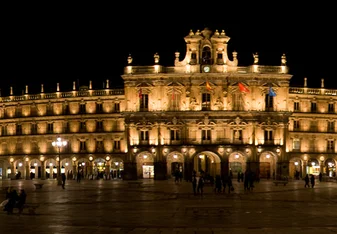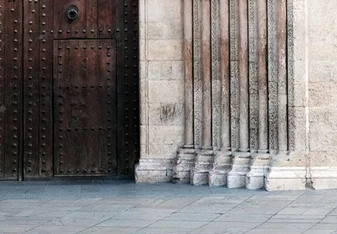Study Abroad Programs in Seville
About
Seville, located in the southwest corner of the Iberian peninsula, is many things at once: a modern, bustling city with a population of 1.5 million, a center of tradition with a rich cultural heritage, and a charming tourist stop with a small town feel. Steeped in Muslim and Catholic history, its cathedral and gardens are spectacular examples of its diverse religious history. It is also well known for its Semana Santa (Holy Week) and Feria de Abril (Fair of April), two unique festivals that draw Spaniards and tourists from around the world.
There are many study abroad programs to choose from in Sevilla, and it is easy to see why. A warm, charming city, filled with orange blossoms, flamenco and fiesta, Sevilla draws numerous American students every year. As Lindsay Allen from World Endeavors describes,
There is a certain magic about Southern Spain, and Sevilla in particular. The Moorish influences set it apart from the rest of Europe, but it remains a vibrant city that is plugged in to the rest of Spain.
Sevilla is small enough to explore by foot, but large and lively enough that you will never be wanting for things to do. It is well known for its Semana Santa (Holy Week) and Feria de Abril (Fair of April), two must-see festivals that draw Spaniards from across the country.
Planning Your Trip
Culture and Immersion
Sevilla’s culture is rich and unique. Steeped in Muslim and Catholic history, its cathedral and gardens are spectacular examples of its diverse religious history. In some ways, going to Sevilla feels like stepping into another era: bullfights are still popular events, and the entire city enjoys classic flamenco music during its festivals. While you’re there, learn some flamenco dancing: a great way to immerse yourself in the culture and impress your friends!
Sevilla is also a bustling urban center with an airport and a population of 1.5 million. The city is full of interesting neighborhoods and winding streets through charming plazas. Spending a semester or year in Sevilla is a great opportunity to learn a lot about Spanish history and society direct from the Sevillanos. Many study abroad programs emphasize immersion, encouraging their students to set up language exchanges with local Spanish students. For example, Sara Troy from CEA notes that CEA sees the entire city as an extension of the classroom, encouraging active learning through excursions around the city and interactions with Spaniards.
Affordability:
Study abroad programs in Sevilla will run you an average of $10,000 per semester, although that number can vary widely by program. When comparing prices, make sure to take into account what is included in the presented cost. Most programs will expect you to cover your own airfare, but will cover things like weekend excursions, while others will not. Jeramy Johnson of API writes, “Our programs are among the most affordable in the field of international education.” API programs in Sevilla include international and local excursions, a mobile phone, and an airport reception, among other things. API offers semester and year programs at the University of Seville or Pablo de Olavide University.
Another affordable option is CIEE, which is the oldest and largest staffed program in Sevilla. Steve Amendo of CIEE notes that CIEE is the best deal economically for a high quality program, adding, “There are no extra charges here; all trips and cultural events are included!” Study in Sevilla with CIEE and you will have a huge variety of courses to choose from, ranging from Mathematics to Spanish Language.
Culture Shock and Support
Wherever you decide to go, you will probably experience some form of culture shock. Moving to Spain will present the particular challenges of adjusting to the schedule, a slower, more relaxed pace of life, and Spanish cuisine. You may find that you love the Spanish schedule and can’t get enough of Spanish food, or you may need some help and time to fully adjust.
When choosing a program to study with in Sevilla, you might consider the level of support that they offer to their students. Programs generally have an on-site coordinator who is available to answer your questions and act as a cultural and language interpreter, as needed. Smaller programs have the benefit of sometimes being more personalized and student-friendly, offering more support services to students. For example, Arturo Artaza at ISA says,
We’ve heard from our alumni that students really appreciate the support services of our staff both domestic and abroad. Our staff members are reliable, offer up-to-date information and often personal tips from their individual experiences abroad.
World Endeavors also emphasizes the personalized support that they provide to their students. As a smaller company, they know all of their students personally and go the extra step to help them with any challenges that may come up. Lindsay Allen of World Endeavors notes that students love World Endeavors’ on-site coordinator, who has been known to have students over to her house for home made tortilla de patatas! Yum! Spend a year or semester in Sevilla studying with World Endeavors, and stay with a family to round out your cultural experience.
Academic Studies Abroad (ASA) is another smaller company that knows their students personally. They have great costumer service, and are enthusiastic about providing support pre-departure and on-site. “People feel a sense of safety with a program that knows their name,” Chelsea Kaloupek from ASA describes.
If you decide you want to dance some Sevillanas with the Sevillanos in Sevilla, you have a variety of great programs to choose from.
Scholarships
Does studying abroad sound fabulous but expensive? While it is true, studying abroad can mean added costs, there are still a variety of ways to offset the extra expenses. If you're not up for opening a lemonade stand, I suggest checking out the following scholarships.
- API offers a variety of scholarships for those participating in their programs - including a few great options in Spain!
- CC-CS scholarship fund offers multiple scholarships, celebrating diversity or rewarding academic excellence for alumni and program participants.
- ISA sponsors the Dr. Carlos Castañeda Memorial Scholarships for students participating in an ISA program in a Spanish-speaking country.
- More Study Abroad Grants and Scholarships
Study Abroad in Seville
Pagination
Frequently Asked Questions
-
Is it safe to live in Spain?
Spain is a very safe country. But, just like the rest of Europe, Spain is notorious for pickpockets. It's important to not carry your passport around and always keep an eye on your phone!
-
How long does it take to get a Spain student visa?
Processing your visa application takes the consulate about 4 weeks. The most lengthy part of the process is collecting all of the documents and securing an appointment. For some consulates it is very difficult to secure an appointment, so it is best to plan ahead.
The documents needed to apply for a student visa are:
- National visa application form + photocopy
- Original passport + photocopy
- One recent passport sized photo (to be attached to the form)
- Copy of the acceptance letter from the Spanish University (in Spanish or with Spanish translation)
- Evidence of funds (could be a statement from the University describing housing or a notarized letter from your parents assuming financial responsibility)
- Proof of health insurance
- Medical certificate (only need for stays longer than 180 days)
- Express mail envelope with pre-paid stamps addressed to yourself with which the consulate may return your passport with the visa
Related Content -
Can I work in Spain with a student visa?
On a student visa, you can work up to 20 hours in Spain with a work authorization requested by the company you'd like to work for. The company will have to request this authorization from the Oficina de Extranjería (Foreigner's Office). It can take from 3 weeks to 3 months to process your application depending on the province, so it's best to apply as early as possible!
Related Content




























